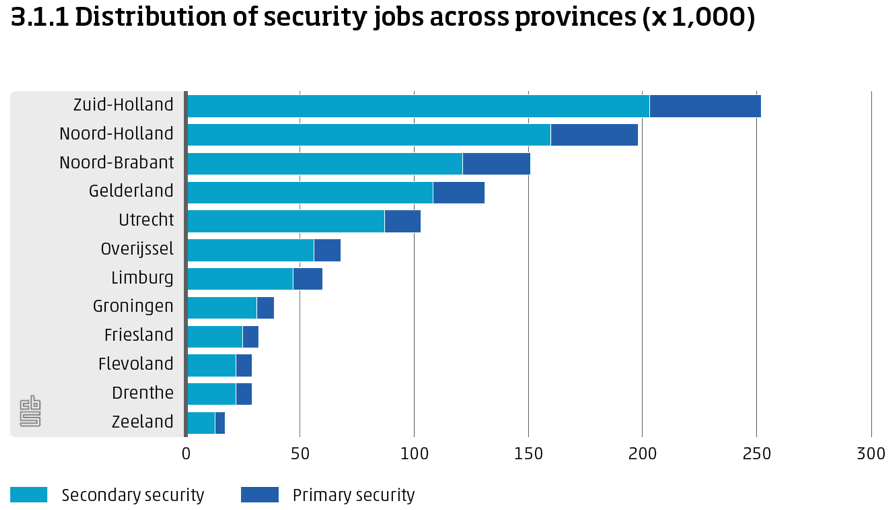
In 2018, 13,2 percent of the Dutch workforce (1.158.000 people) was employed in a security related occupation. A growth of 80.000 jobs compared to 2016. Compared to other occupations, people with security related jobs more often have a full-time permanent contract, often fall into the middle age range and are more often highly educated. The largest total number of persons employed in security jobs was found in South Holland province. These are outcomes of the updated research ‘Education and labour market in the security domain’, which was published by Statistics Netherlands (CBS).
Growth in secondary security jobs
The number of employed persons with primary security jobs, such as firemen, policemen and military personnel, remained fairly constant between 2014-2018. Primary and secondary security personnel combined (including lawyers, judges, cyber security specialists, fraud examiners and social workers that i.e. deal with domestic violence, mentally disordered people and radicalisation) increased every year since 2014. So, growth can be attributed to non-traditional occupations where security is only a part of the job.
Regional differences
The province of Utrecht has the highest share of the working population employed in security jobs (15 percent) and Zeeland has the lowest share (10 percent). The largest total number of persons employed in both primary and secondary security jobs was found in South Holland (252.000 jobs). Hourly wages vary a big deal per labour market regions and provinces. The largest differences were found between region Groot Amsterdam, where graduates from upper secondary vocational education earned 129 percent of the national median directly after graduating in a security programme, appose to 71 percent in Gorinchem. Generally, wages seem to be higher in North Holland and South Holland but depend on the level of education.

Sectors and type of work
In 2018, about 43 percent of security-related professionals are active in two big sectors: Health & Social Work Activities (22 percent) and Public Administration & Services (21 percent). Relatively, the number of employed persons in a security related occupation is largest in the Information & Communication sector (49 percent in 2018, which has a big impact on all sectors and includes cyber security) and Public Administration & Services (48 percent in 2018, which includes police forces and military personnel).
The biggest and continuously growing part between 2013 and 2018 of all security occupations are in engineering (nearly 40 percent in 2018), opposed to social work, security, organisation & government and legal (27, 14, 13 and 6 percent respectively).
Education
In 2018, 58 percent of all employed persons in a security related occupation had a security related education. The share is highest in Overijssel (63 percent) and lowest in Flevoland (53 percent). Flevoland together with Utrecht might find it difficult to find staff with relevant education because of the above average share of security jobs.
In the 2018/’19 school year, 133.000 students were enrolled in a security related programme (11 percent). Higher professional and university level increased from 75 thousand in school year 2013/’14 to 105 thousand in school year 2018/’19. However, at upper secondary vocational level the number of students decreased from 37 to 29 thousand over the same period. Over time the number of participants in security related programmes in Engineering increased from almost 40 thousand participants in school year 2013/’14 to just over 54 thousand participants in school year 2018/’19.
In general, we see a trend towards more highly educated security workers and that education of security workers is more often security related.
Making your Career in Security
The CBS-study was commissioned by HSD Office as part of the Human Capital Agenda Security 2019-2022 and supported by the Province of South Holland. The insights are deemed important for the educational institutes developing courses, the employers in the security domain and future talent orientating themselves on educational programmes and labour market opportunities.
To stimulate a career in security and to provide insights in the available jobs, studies and courses, HSD Office maintains the www.securitytalent.nl platform. Mark Ruijsendaal (Innovation Liaison, HSD): “What we notice daily is that some positions are hard to fill within the security domain. In 2019 specifically application developers, cyber security specialists, cyber consultants and leadership roles were on top of the list”.
English report and statistics (Dutch or English) can be downloaded from CBS-site.